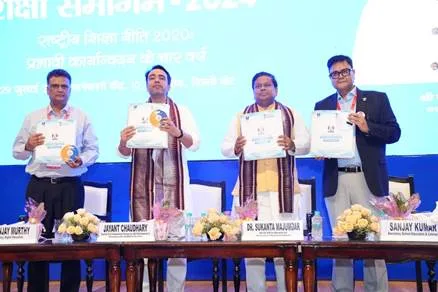The Ministry of Education celebrated the 4th anniversary of the implementation of the National Education Policy 2020 with Akhil Bhartiya Shiksha Samagam 2024 in New Delhi’s Manekshaw Centre Auditorium today. Minister of State for Education & Minister of State (IC), Ministry of Skill Development & Entrepreneurship, Jayant Chaudhary and Minister of State for Education & Development of North Eastern Region, Dr. Sukanta Majumdar were present at the event. K. Sanjay Murthy, Secretary, Department of Higher Education; Sanjay Kumar, Secretary, Department of School Education & Literacy; academicians, Vice Chancellors of the universities, officials, and students, also attended the event.
The Ministers launched several significant NEP 2020 initiatives of the Ministry of Education, such as Dedicated TV Channels to facilitate learning of various Indian languages, a Tamil Channel; Primers for early graders in 25 Indian languages in pursuance to 54 already done; 10 Bagless days Guidelines aimed to transform learning into a fun, stress-free experience in schools; Career Guidance Guidelines, a massive library of over 500 job cards; NMM (National Mission for Mentoring) and National Professional Standards for Teachers (NPST) in Braille and Audio Books; School Innovation Marathon by AICTE, NITI Aayog, and AIM; and a book on Graduation Attributes and Professional Competencies. They also unveiled four books and lecture notes aimed at promoting the Indian Knowledge Systems (IKS) among students and teachers.
Dharmendra Pradhan, in his message, said that the four-year journey of NEP 2020 has been about bringing in transformative change in the country’s education system for nurturing a new generation of learners. NEP 2020 stands as a symbol of hope for transforming the learning landscape, harnessing the country’s demographic dividend, empowering the population and driving socio-economic development, he also mentioned. He said the implementation of NEP has made learning more vibrant and guided in making the country’s education more futuristic, rooted, global and outcome-oriented. Expressing his gratitude to Prime Minister Narendra Modi, he reiterated his commitment to implement NEP in letter and spirit to make the country a 21st-century knowledge economy.
He also appreciated the musical performance of ‘Panch Pran’ by the students of Kendriya Vidyalaya Sangathan at the function, which was inspired by the vision of Prime Minister Narendra Modi.
While addressing the audience Jayant Chaudhary highlighted the immense impact of the teachers and the values and contributions they make in shaping the lives of their students. Reigns of the country truly lies in the hands of the teachers, he added. Farmers, scientists, and teachers are the three pillars of society who envision the nation’s future, he said. Chaudhary also mentioned how, following the recommendations of the stakeholders of the education ecosystem, the forward-looking policy in the shape of the NEP 2020 was formulated. Breaking away from the legacy of the old system, it revolutionised the educational landscape and aligned it with the needs of the 21st century, he added.
Chaudhary emphasised the importance of States as they are the important stakeholders. He appealed to them to be a partner in the journey with a collective effort and strategy that will benefit the entire education ecosystem involving students, teachers, administrators, and more. He also expressed his gratitude to Dharmendra Pradhan for emphasising the future challenges and how they are to be mitigated. The benefit of the progressive, forward-looking and expansive NEP 2020 can be achieved only with its collective implementation, Chaudhary added. Chaudhary specifically mentioned the presentation on APAAR, which he termed as practical for highlighting not only the positive points but the challenges as well.
Dr. Sukanta Majumdar in his address expressed gratitude to Prime Minister Narendra Modi for his farsighted and progressive ideas that shaped the NEP 2020 which embraces the ideal of education as a transformative journey for personal development, beyond making it just a means to obtain certificates. NEP 2020 includes India’s rich heritage, the synthesis of traditional knowledge with modern advancements, and the integration of value education with nation-building at its core, Dr. Majumdar said. He also said that the Akhil Bhartiya Shiksha Samagam, embodying the essence of “Vikas bhi Virasat bhi,” represents a unique participatory dialogue steered by stakeholders from every corner of the education sector. Dr. Majumdar also expressed his gratitude to Shri Dharmendra Pradhan for successfully spearheading the NEP 2020 for the last three years.
Commending the reformist agenda of the NEP 2020, K. Sanjay Murthy highlighted on seamless integration of school and higher education through the APAAR platform. Presenting a vote of thanks Sanjay Kumar informed how Prime Minister Narendra Modi has mentioned NEP 2020 as the basis for radical change and urged everyone to take the recommendation of the Policy to the grassroots level. He also informed about the week-long campaign, “Shiksha Saptah” that was celebrated in schools all over the country.
Govind Jaiswal, Joint Secretary, Ministry of Education, made a presentation on Credit accumulation and seamless creditisation of all types of learning including skilling by using the Platform of APAAR ID.
Akhil Bharatiya Siksha Samagam (ABSS) has been conceptualised as an event to celebrate the adoption of National Education Policy 2020 to reinvigorate the commitment of various stakeholders for its effective implementation and to realise the collective strength for achievement of shared goals through collaborative efforts.
ABSS 2024 witnessed six thematic sessions on different themes & initiatives of NEP 2020 related to Schools and Higher Education. These are:
The event was attended by State Education Secretaries, State Project Directors of Samagra Shiksha, SCERT Directors, State Directors of Primary Education and Secondary Education, Chairperson, State School Boards including CBSE, Head of Autonomous Bodies of DoSEL, Regional Officers of CBSE, KVS, NVS, Principals of DIETs and Schools, Students from KV, JNV, CBSE schools, VCs / Directors / Heads of HEIs – 80 from CFIs and 100 from State Universities, State Project Directors of RUSA, Officials of DoSEL, DoHE, MSDE, UGC, AICTE, NETF, NCVET, NIEPA, ICSSR, ICHR, Officials from other Ministries, Heads of CSO, Panelists for the Breakaway sessions etc.






